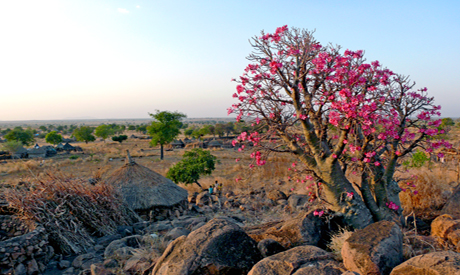
Beautiful Southern Kordofan at times of peace – Photo by Mohamed El Hebeishy
Monsieur Ibrahim (his identity is concealed for safety concerns) masterfully hides a cheerful person behind his solemn face. That was my first impression when I met him three years ago during my stay in Sudan. When I spoke to him last night his voice was broken.
“I still don’t believe that I am still alive,” he exclaimed, bewildered. “Things were apprehensively quiet until 5pm; that’s when heavy fighting flared. There were bullets, bombs and a lot of screams. I tried to take refuge in my house, but even there it was not safe. All of a sudden I was surrounded with more than 15 young men armed with all sort of guns, swords and machetes inside my house.” Monsieur Ibrahim sobbed for a minute as he recalled that night on 9 June when terror entered his world.
“They kept calling me khawaja (colloquial term for white-skinned foreigner) accusing me of being a spy. They beat the living daylight out of me, before I eventually passed out.”
When Monsieur Ibrahim woke up, his house was in tatters, all his valuables were stolen and his head was bleeding. From that moment Ibrahim’s two-day escape from Kadugli began.
Ibrahim first hid in the car trunk of a local friend who took him as far as El Shaier on the outskirts of Kadugli, South Kordofan’s state capital. “I sneaked a peek while my friends sped-up through the town; everything my eyes came across was burned, even the small tukuls (Sub-Saharan grass-thatched, mud huts) where people live were on fire.”
Monsieur Ibrahim spent his night in El Shaier where thousands other displaced people took shelter in an area secured by the United Nations Mission in Sudan (UNMIS). “Violence resulted in thousands of people being displaced from their homes. Many of these – anywhere between two to five thousand by last night [the second night of fighting] – have sought refuge here,” said UNMIS Kadugli Head of Office Mark Rutgers. Since then figures have significantly increased, putting the total number of Internal Displaced People (IDP) at more than 40,000.
From El Shaier, Monsieur Ibrahim managed to find transportation to Dilling, 80km north of Kadugli, before boarding an overloaded bus for a backbreaking 14-hour drive to the Sudanese capital, Khartoum.
Southern Kordofan is mainly defined by a fertile, hilly area known as the Nuba Mountains. Judging by the area’s history, the violence that first erupted on 5 June in Um Dorain, 32 km southeast of Kadugli, does not come as a surprise.
The Nuba Mountains are inhabited by an amalgam of more than 50 tribes who are collectively called the Nuba people (not to be confused with Nubians who live between southern Egypt and northern Sudan). Nuba people were marginalised under various Khartoum regimes. In the mid-1980s trouble escalated when Sadiq Al Mahdi’s government started arming Arab militias, known as murahalin, to raid Nuba farms and terrorise the people.
Since southern Kordofan straddles the blurry line between Sudan’s north and south, the Nuba were right in the middle of a civil war, siding with the south’s SPLA (Sudan People Liberation Army) as violence progressed.
Long years of fighting finally came to an end with the signing of first the Bürgenstock Agreement in January 2002, later the peace protocols in May 2004 and finally the CPA (Comprehensive Peace Agreement) in January 2005. The agreements did call for significant autonomy for the Nuba Mountains; however, they failed to explicitly call for a referendum by which the Nuba could decide on a political party to join. When south Sudan made the decision to secede, it put the southern Kordofan in a very precarious position.
Neither north nor south, the people of the Nuba Mountains continue to suffer as they are left once again in limbo. For survivors of the latest violence, the fates of others are haunting. “I am grateful to God I am still alive. I was lucky, many others weren’t,” says Ibrahim.
Short link: